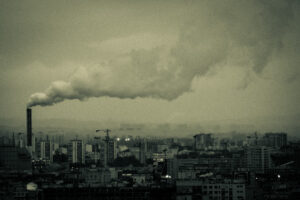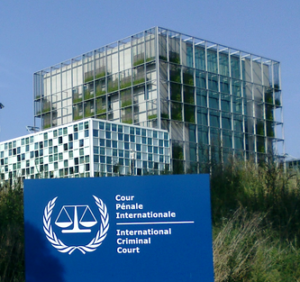The Climate Crisis and Ecocide
The climate crisis creates food insecurity, displacement, disease, water scarcity, poverty, and violence. [1]
The climate crisis is a force multiplier of conflict.
Ecocide
In 1970, Professor Arthur Galston, a biologist at Yale University, used a new word – ecocide. [2]

We are killing our home. Image courtesy of Damian Bakarcic is unmodified and licensed under CC BY 2.0.
Ecocide means to destroy the environment.
The root eco comes from the Greek oikos, meaning home. And cide, from cidere, means to kill. [3]
Galston used this word, ecocide, for the devastation that the US caused by spraying 20 million gallons of Agent Orange in Vietnam, Cambodia, and Laos during the Vietnam War. [4] Agent Orange defoliated the jungle and caused cancers, neurological disease, and birth defects in at least 3 million people. [5]
Ecocide means killing one’s home – and that’s what we’re doing. We see it every day. Droughts, floods, fires, hurricanes, melting icecaps and rising seas, dead coral reefs and extinct animals and botanical species – we are killing our home.
Galston advocated for an international agreement to ban ecocide. He defined ecocide as “devastation and destruction which aim at damaging or destroying the ecology of geographic areas to the detriment of all life, whether human, animal, or plant.” [6]
Stop Ecocide International works with leaders around the world to make ecocide an international crime. [7] This is now becoming a reality.

The ICC hears cases about international human rights crimes. Image courtesy of OSeveno is cropped and licensed under CC BY-SA 4.0.
The International Criminal Court in The Hague, Netherlands is the most important court in the world. It prosecutes accused perpetrators of genocide, crimes against humanity, war crimes, and the crime of aggression. [8] Ecocide would be added to these four crimes, the worst atrocities in the world. Ecocide would become the fifth international human rights crime. [9]
On September 9, 2024, leaders of three island nations that are at risk of disappearing under rising seas submitted a proposal to the ICC to officially make ecocide the fifth crime. [10]
The United States is not a party to this Court. [11] The word ‘ecocide’ is seldom heard in the United States. But countries around the world, including the European Parliament, have made ecocide a crime in their domestic statutes. [12]
But there must be a global commitment to solve this global crisis.
On August 28, 2023, the UN affirmed that children can sue nations over climate destruction. [13] This followed a lawsuit brought by young people in Montana against the state. [14] We are seeing a patchwork of cases in the US. We need an international framework.
Criminalizing ecocide internationally can
- deter malfeasance,
- punish perpetrators,
- highlight individuals and entities taking positive action, and
- encourage activities to mitigate and prevent lower-level damage. [15]
Ecocide can also be prosecuted as an element of any of the other four atrocity crimes. [16] In addition, ecocide can be adopted as a crime in the legal systems of any nation. [17]

Map created using MapChart and is licensed under CC BY-SA 4.0. Data sourced from [17].
However, the heads of multi-national corporations in the US or China could be tried for perpetrating ecocide in places that are party to the Court. Precedent has been set in prosecuting crimes of genocide. [19]
Support for an international ecocide law is endorsed by public figures including Jane Goodall and Pope Francis. [20]
The Human Consequence of Ecocide: Violence
Since 2014, the U.S. Department of Defense (DoD) has warned that the climate crisis is a ‘threat multiplier’ of violence: “There is significant interaction between conflict and climate changes.” [21] The United Nations has issued similar warnings since 2004. [22]
The single greatest stressor is the lack of water.
Increasing desertification in Sudan’s Darfur region led to fighting over scarce water. Since 2003, 400,000 people have perished in a genocide. Millions are displaced. [24]
Years of droughts in Rwanda, and drought-induced hunger, fueled Rwanda’s genocide in 1994. [25]
Syria’s severe droughts that began in 2007 led to devastating crop failure. In 2011, President Bashir al-Assad responded with violence to peaceful demonstrations. Over 306,000 people were murdered, 13 million were internally displaced, and 6.7 million people fled from Syria, the consequence of drought and hunger. [26]
The world, our home, is in our hands.
Climate Migration
Climate migration occurs when people must flee from their homes due to climate-related disasters that are temporary or permanent, within countries or across borders. [27]
It is estimated that 1.6 billion people will be displaced by the year 2050. [28]
Women and girls, children, the sick, and the elderly are disproportionately affected, often left behind in a climate catastrophe. [29]
Although climate migrants are often referred to as “climate refugees,” most do not meet the legal definition of ‘refugee.’ The 1951 UN Refugee Convention defines a refugee as: “someone who is unable or unwilling to return to their country of origin owing to a well-founded fear of being persecuted.” [30]
Climate migrants have not fled from violence or persecution, and often they stay within their national borders. They do not qualify for refugee status and are deprived of important protections afforded to refugees.
We must hold perpetrators responsible for killing our home – just like we hold perpetrators responsible for genocide, for killing a people.
The time is now: to share this message, to encourage passage of the word ‘ecocide’ at municipal, state, and organizational levels, and to hold perpetrators accountable for ecocide.
Take action here.
Download a one-page fact sheet about ecocide here.
Read about ecocide as a ‘force multiplier’ of conflict here.
Read about climate migration and the law here.
Read about climate change legislative developments here.
Download a debate activity about ecocide here.
Read The Guardian‘s article, “Climate crisis ‘wreaking havoc’ on Earth’s water cycle, report finds” here.
Take action here.
Find resources including academic articles, fiction and non-fiction books, documentaries, and other resources about climate change here.
References
[1] United Nations Climate Action. (n.d.). Five ways the climate crisis impacts human security. United Nations Climate Action. https://www.un.org/en/climatechange/science/climate-issues/human-security
[2] Pannett, R. (2024, September 10). What is ecocide and could it become an international crime like genocide? The Washington Post. https://www.washingtonpost.com/climate-environment/2024/09/10/ecocide-law-crime-genocide-icc/
[3] Better Planet Education. (n.d.). Ecocide – What is Ecocide? Better Planet Education. https://betterplaneteducation.org.uk/factsheets/ecocide-what-is-ecocide
[4] Pannett, R. (2024, September 10). What is ecocide and could it become an international crime like genocide? The Washington Post. https://www.washingtonpost.com/climate-environment/2024/09/10/ecocide-law-crime-genocide-icc/
[5] History. (2019, May 16). Agent Orange. History. https://www.history.com/topics/vietnam-war/agent-orange-1
[6] Sarliève, M. (2020). Ecocide: Past, Present, and Future Challenges. In W. Leal Filho, A. Azul, L. Brandli, A. Lange Salvia, A., & T. Wall (Eds.), Life on Land. Encyclopedia of the UN Sustainable Development Goals (pp. 1-11). Springer. https://doi.org/10.1007/978-3-319-71065-5_110-1
[7] Stop Ecocide International. (n.d.). https://www.stopecocide.earth/
[8] International Criminal Court. (n.d.). How the Court works. International Criminal Court. https://www.icc-cpi.int/about/how-the-court-works
[9] Sharma, K. (2021, November 26). Ecocide: Will it be the Fifth International Crime. SCC Times.
https://www.scconline.com/blog/post/2021/11/26/ecocide/
[10] Stop Ecocide International. (2024). Mass destruction of nature reaches International Criminal Court (ICC) as Pacific island states propose recognition of “ecocide” as international crime. Stop Ecocide International. https://www.stopecocide.earth/2024/mass-destruction-of-nature-reaches-international-criminal-court-icc-as-pacific-island-states-propose-recognition-of-ecocide-as-international-crime
[11] Coalition for the International Criminal Court. (n.d.). United States. Coalition for the International Criminal Court. https://www.coalitionfortheicc.org/country/united-states
[12] Ecocide Law. (n.d.). Ecocide / serious environmental crimes in national jurisdictions. Ecocide Law. https://ecocidelaw.com/existing-ecocide-laws/
[13] Sengupta, S. (2023, August 28). Children Have a Right to Sue Nations Over Climate, U.N. Panel Says. The New York Times. https://www.nytimes.com/2023/08/28/climate/united-nations-children-climate-lawsuit.html
[14] PBS. (n.d.). Teens take Montana to court over fossil fuels’ impact on climate change. PBS. https://www.pbs.org/wnet/preserving-democracy/video/teens-take-on-montana-in-fossil-fuels-case/
[15] Hamilton, R. (2024, September 23). Why Criminalize Ecocide? Experts Weigh In. Just Security. https://www.justsecurity.org/100172/why-criminalize-ecocide-experts/
[16] Koop, F. (2024, January 16). Ecocide: What is it and should it be considered an international crime? Dialogue Earth. https://dialogue.earth/en/nature/387886-ecocide-what-is-it-and-should-it-be-considered-an-international-crime/
[17] Ecocide Law. (n.d.). Ecocide / serious environmental crimes in national jurisdictions. Ecocide Law. https://ecocidelaw.com/existing-ecocide-laws/
[18] International Criminal Court. (n.d.). How the Court works. International Criminal Court. https://www.icc-cpi.int/about/how-the-court-works
[19] ICC Personal Jurisdiction on Corporations for Criminal Liability and/or Civil Liability for Reparations. (2021, May 13). Harvard Law Journal. https://journals.law.harvard.edu/ilj/2021/05/icc-personal-jurisdiction-on-corporations-for-criminal-liability-and-or-civil-liability-for-reparations/
[20] Stop Ecocide International. (n.d.). https://www.stopecocide.earth/
[21] Banusiewicz, J. (2014, October 13). Hagel to Address ‘Threat Multiplier’ of Climate Change. U.S. Department of Defense. https://www.defense.gov/News/News-Stories/Article/Article/603440/
[22] United Nations Climate Action. (n.d.). Five ways the climate crisis impacts human security. United Nations Climate Action. https://www.un.org/en/climatechange/science/climate-issues/human-security
[23] European Commission. (2018, June 20). New World Atlas of Desertification shows unprecedented pressure on the planet’s natural resources. European Commission. https://ec.europa.eu/commission/presscorner/detail/en/ip_18_4202
[24] Cohn, X. (2024, August). Sudan – Darfur – South Sudan. World Without Genocide. https://worldwithoutgenocide.org/genocides-and-conflicts/darfur-genocide
[25] World Without Genocide. (2021, January). Rwandan Genocide. World Without Genocide. https://worldwithoutgenocide.org/genocides-and-conflicts/rwandan-genocide
[26] Middleton, E. (2024, October). Syria. World Without Genocide. https://worldwithoutgenocide.org/genocides-and-conflicts/syria
[27] Tandon, A. (2024, April 10). In-depth Q&A: How does climate change drive human migration? Carbon Brief. https://interactive.carbonbrief.org/climate-migration/
[28] Institute for Economics & Peace. (2020, September 9). Over one billion people at threat of being displaced by 2050 due to environmental change, conflict and civil unrest. Institute for Economics & Peace. https://www.economicsandpeace.org/wp-content/uploads/2020/09/Ecological-Threat-Register-Press-Release-27.08-FINAL.pdf
[29] United Nations Climate Action. (n.d.). Why women are key to climate action. United Nations Climate Action. https://www.un.org/en/climatechange/science/climate-issues/women
[30] Bergeron, T. (2023, January 20). No Refuge for ‘Climate Refugees’ in International Law. Lewis & Clark Law School. https://www.lclark.edu/live/blogs/200-no-refuge-for-climate-refugees-in-international


